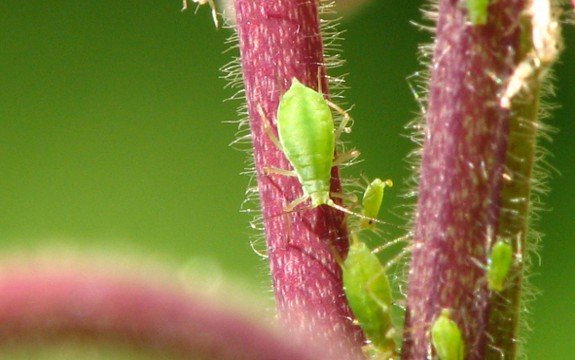Study: Monsanto’s Bt Crops Transform Non-Targeted, Benign Bugs into Major Pests

 Bacillus thuringiensis, known as the Bt toxin, has been genetically fused with food crops in an effort to control damage from pests. This Monsanto-headed development has led to genetically modified BT corn, Bt canola, and Bt soy, to name a few. We already know that the health risks of this toxin in our food supply are many, but damage is still being revealed. A new study suggests that Bt crops, created to fight certain pervasive pests, could make things easier for other seemingly-benign insects, turning them into the next threat.
Bacillus thuringiensis, known as the Bt toxin, has been genetically fused with food crops in an effort to control damage from pests. This Monsanto-headed development has led to genetically modified BT corn, Bt canola, and Bt soy, to name a few. We already know that the health risks of this toxin in our food supply are many, but damage is still being revealed. A new study suggests that Bt crops, created to fight certain pervasive pests, could make things easier for other seemingly-benign insects, turning them into the next threat.
The study, published in the Proceedings of Royal Society, focuses on the issue of the Bt technology inadvertently affecting insects that aren’t even targeted. The researchers also analyzed the necessity of the Bt plants themselves.
In essence, the Bt technology in crops like corn and soy could encourage predatory behavior in pests it was not designed to target. The title of the study, “Pest trade-offs in technology: reduced damage by caterpillars in Bt cotton benefits aphids,” aptly explains the problem.
The researchers suggest:
“Although studies have now reported increased populations of non-target herbivores in Bt cotton, the underlying mechanisms are not fully understood. We propose that lack of herbivore-induced secondary metabolites in Bt cotton represents a mechanism that benefits non-target herbivores. We show that, because of effective suppression of Bt-sensitive lepidopteran herbivores, Bt cotton contains reduced levels of induced terpenoids. We also show that changes in the overall level of these defensive secondary metabolites are associated with improved performance of a Bt-insensitive herbivore, the cotton aphid, under glasshouse conditions.”
In other words, if Bt technology encourages the transformation of otherwise benign pests into predatory ones, the justification for the technology in modern agriculture—the reduced need for applied pesticides—is moot as farmers would have to apply further pesticides to control the new, predatory and formerly-harmless pests.
Bt crops aren’t only bad for the plants and the insects (including important pollinators), they are bad for you. Research has shown the toxin to be extremely damaging various organs in the body, among other things.
For more information on how to reduce your exposure to these toxins and how to detox them from your body, read here: 5 Steps for Avoiding and Detoxing the Bt-Toxin.
Additional Sources:

Mother Nature will always win!
Do not F with nature. It will end with nature Fing us.